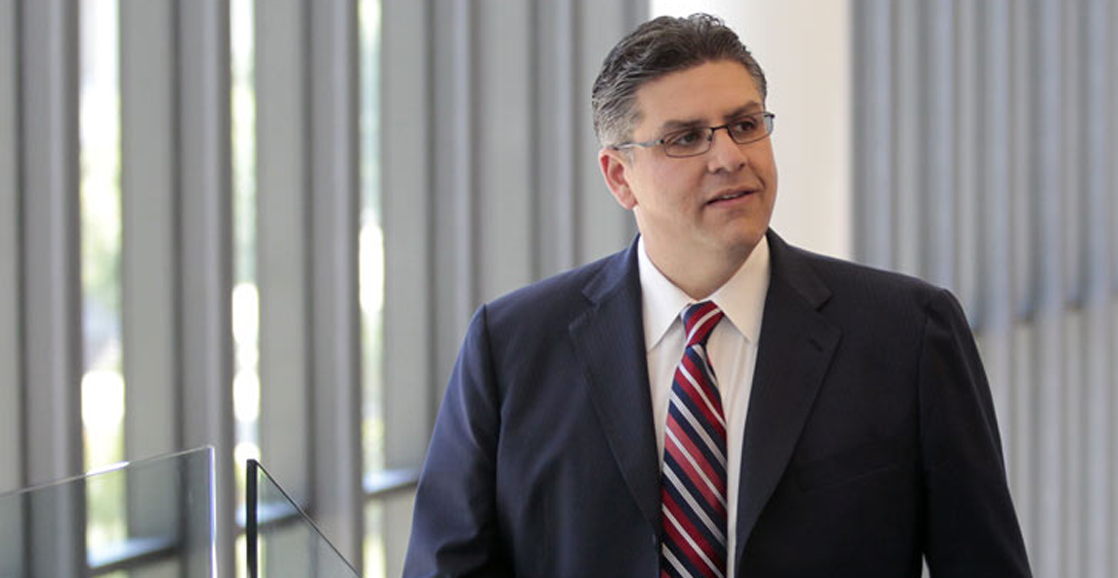President Trump, meet Lee Brand – the mayor who is expanding the Administrative State even as you try to shrink it.
Brand on Feb. 2 will put an exclamation point on his first month in office by sending his Rental Housing Improvement Act to the City Council. Fresno’s rental housing market will never be the same should it pass.
That’s a blessing, the Administration says.
“The City of Fresno has historically struggled to effectively address substandard rental housing and related health and public safety violations….,” writes planning director Jennifer Clark in her analysis of the act. “Due to the (quantity) of rental housing units and historic code enforcement related issues, it is imperative that the City commit the resources needed to implement an effective rental housing inspection program….”
The Feb. 2 hearing figures to severely test the new Administration’s ability to compress complexity and idealism into something easily digestible by average Joes and Janes.
But the essential notion is this: Too many Fresnans are living in a misery caused exclusively by their slumlords; government has a regulatory plan to end the misery and ensure it never returns.
The Rental Housing Improvement Act’s regulations run to 15 pages. The ordinance itself is 14 pages. Clark’s report to the council covers five single-spaced pages.
Perhaps the most substantive change to the code enforcement status quo is operationally.
“In order to effectively and systemically deal with substandard rental housing issues,” Clark writes, “the Act bifurcates the code enforcement activities by creating a separate division that will focus solely on rental housing code violations.”
The beef among critics is a reactive code enforcement model. Somebody calls with a complaint; a code enforcement inspector responds. Brand’s plan is to demote reactive enforcement to secondary importance, especially when it comes to rental housing. The aim now is to be proactive – search for violations, then pounce with all the power City Hall can muster.
The new division will have a division manager, a supervisor, seven senior community revitalization specialists, two community revitalization specialists, three lawyers from the City Attorney’s Office, a paralegal and a legal secretary.
“In the event the pro-active inspections identify problem properties with significant health and safety code violations,” Clark writes, “the re-active code inspections will step in to conduct a comprehensive follow-up inspection on the problem properties. The team will work closely with the City Attorney’s office to aggressively prosecute property owners who do not correct health and safety violations.”
Mayor Ashley Swearengin in December presented the council with her version of an inspection program. The council, led by Council Member Steve Brandau, asked for a two-month delay until Brand took office. The thinking was that if a new mayor has to make the plan work, then the new mayor should put his own stamp on it.
Swearengin’s plan included an outside party – one unaffiliated with City Hall except by contract – to do some of the proactive inspecting. Brand’s plan keeps everything in-house.
Otherwise, it’s hard to see how the Brand plan is much different from what’s been kicking around City Hall since September 2014 when the Mayor-Council Code Enforcement Task Force was formally launched.
There would be a registry; owners of residential rental units must sign up and list pertinent information.
There would be periodic inspections; if trouble is found, it must be fixed pronto.
The number of units to be inspected would depend on the number of units in the apartment complex; the plan for inspection of single-family rental houses would come later.
There would be exceptions to properties that must be inspected; the thinking is that government entities such as the Housing Authority already deliver good housing all the time.
Property owners would pay for the inspections at $100 per unit; property owners would face hefty fines if they weren’t prompt in fixing problems.
The regulation of the interiors of motels, hotels and condominiums would come another day; the regulation of black market/”underground” rental housing would come from old-fashioned, reactive code inspectors (this last half is my view, not Clark’s).
Fresno has an estimated 85,000 rental housing units.
“This Act is designed to efficiently filter, via well-organized pro-active inspections, identify and prioritize substandard housing properties from the vast number of rental units to be inspected,” Clark writes. “It is believed the large majority of rental properties are safe and well-maintained by responsible property owners and professional property management companies.”
A few thoughts:
1.) Council Member Brandau on Saturday told me that he’s expecting the Act to pass on a 4-3 vote. “I think Lee is hoping for five,” Brandau said.
Brandau said Brand’s version “is a superior product to what Ashley put out there. But at the end of the day, it’s about inspections and the expansion of government.”
Brandau declined to specifically predict the votes of his six council colleagues. But, he added, he’s likely to vote no.
As to proven slumlords, Brandau said: “If we’ve got bad apples, hammer them.”
2.) Clark in her report writes that the Act “is consistent with the ASET program….” ASET stands for Anti-Slumlord Enforcement Team, a code-enforcement reform proposed by Brandau and Council Member Clint Olivier in November. The council, which included Brand at the time, approved the program.
A key feature of ASET is an ombudsman with several roles. One is as a representative of aggrieved tenants. Got serious structural problems with your apartment and an indifferent landlord? Call the ombudsman, who has the authority and skill to get results.
It’s not clear to me how the ombudsman (not to mention other features of ASET) would fit into Brand’s proposal.
3.) I chatted some months ago with Steve Hrdlicka of the local Apartment Association. We were joined by several of Hrdlicka’s associates. They were concerned about the direction of the direction of Swearengin’s plans for code enforcement.
In particular, they felt law-abiding landlords were being turned into scapegoats by politicians and the media. The purpose of this demagoguery was to extract money and force submission from responsible property owners.
“Don’t worry,” I said. “You’re in the catbird seat.”
I was thinking of the old saying “organization is oligarchy.”
Efficient organization is pivotal to success. But efficient organization is hard. The responsible property owners of the Apartment Association will adjust to new rules because they know how to get things done. And doing so will only enhance the responsible landlords’ power at City Hall.
New rules will wreak havoc with the disorganized and incompetent landlords. Are they evil and greedy people? Perhaps. Or maybe, for the most part, they’re small-time property owners blindsided by the Peter Principle.
4.) Finally, the Rental Housing Improvement Act feels like a signal of what to expect from the Brand Era.
A problem (rental housing) affecting quality of life is identified. City Hall responds to the crisis. The response is an expansion of government power, resources and regulations. Because of the seriousness of the crisis, and the horror should the crisis ever return, the government expansion of responsibility must continue.
Brand eked out a victory over Henry R. Perea in the November election by promising to fulfill all of Swearengin’s plans for a better Fresno. Housing regulation was one of Swearengin’s plans. She had many others, as I reviewed in an earlier piece for CVObserver.
Each of Swearengin’s plans involves a crisis that government must fix. All of these crises are connected. To resolve one crisis and not the others is to resolve none.
The Administrative State’s best friend is Lee Brand.










